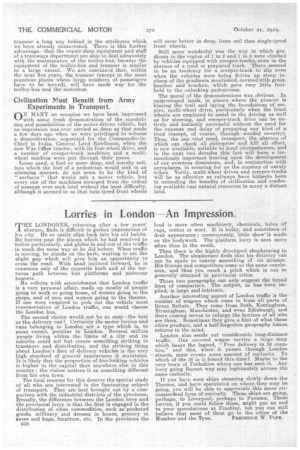Lorries in London An Impression.
Page 2

If you've noticed an error in this article please click here to report it so we can fix it.
91HE LONDONER, returning after a few years' absence, finds it difficult to gather impressions of Ills city. He so easily slips back into his old habits. He hurries past the places which he had resolved to notice particularly, and glides in and out of the traffic in much the same way as he did before. When traffic is moving, he stands on the kerb, waiting to see the slight gap which will give him an opportunity to cross the road. With head inclined forward, he is conscious only of the opposite kerb and of the tortuous path between bus platforms and motorcar bonnets.
He reflects with astonishment that London traffic is a very personal affair, made up mostly of people going to work or going home, of women going to the shops, and of men and women going to the theatre. If one were required to pick out the vehicle most representative of London traffic, one would choose the London bus.
The second choice would not be so easy—the taxi or the delivery van? Certainly the motor lorries and -vans belonging to London are a type which is to some extent, peculiar to London. Several million people living within the limits of a city and its suburbs could not but create something striking in transport, and distribution, and the striking thing about London's fleet of delivery vehicles is the very high standard of general appearance it maintains. It is likely that the proportion of fine-looking vehicles is higher in the capital than anywhere else in this country ; the visitor notices it as something different from his own town.
The local reasons for this deserve the special study of all who are interested in the fascinating subject of transport. They are best brought out by a comparison with the industrial districts of the provinces. Broadly, the difference between the London lorry and the provincial lorry is that the first is engapd in the distribution of clean commodities' such as packeted goods, millinery and dresses in boxes, grocery in cases and bags, furniture, etc. In the provinces the C18 load is more often machinery, chemicals, bales of rags' cotton or wool. It is bulky, and sometimes of drab appearance ; consequently, little show-is made on the bodywork. The platform lorry is seen more often than in the south.
Then there is the highly developed shopkeeping in London. The shopkeeper finds that his delivery van can be made to convey something of it mission. His friends and competitors come to the same conclusion, and thus you reach a pitch which is not so generally attained in provincial cities.
These two paragraphs can only suggest the broad lines of comparison. The subject, as has been implied,' is large and intricate.
Another interesting aspect of London traffic is the number of wagons which come in from all parts of Great Britain. They come from Bath, Nottingham, Birmingham, Manchester, and even Edinburgh, and their coming serves to enlarge the horizon of all who see them. Sometimes they give a hint of what these cities produce, and a half-forgotten geography lesson returns to the mind.
London also sends out considerable long-distance traffic. One covered wagon carries a large map which bears the legend, " Free delivery in 36 counties," and this, when it passes through London streets, must create some amount of curiosity. To which of the 36 is it bound this time? Maybe to the very town of Yorkshire where one has seen it. Any lorry going Barnet way may legitimately arouse the same curiosity.
If you have seen ships steaming slowly dawn the Thames, and have speculated on where they may be going, you will be able to appreciate this more circumscribed form of curiosity. Those ships are going, perhaps, to Liverpool, perhaps to Panama. These lorries, if you could follow them, might put an end to your speculations at Finchley, but you can still believe that most of them go to the cities of the
Humber and the Tyne. FREDERICK W. POPE.






























